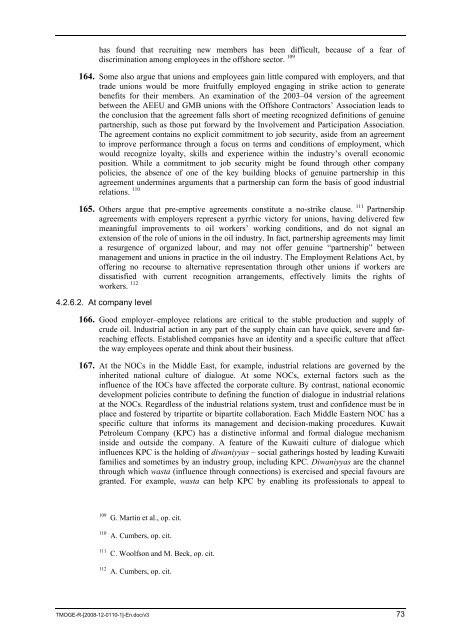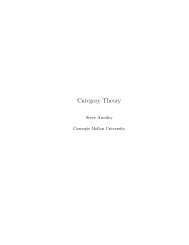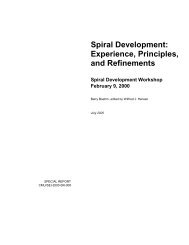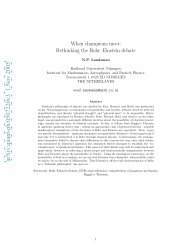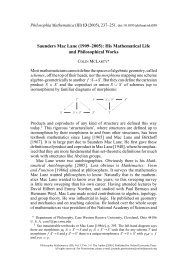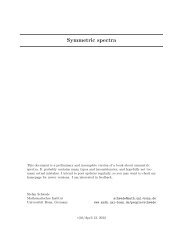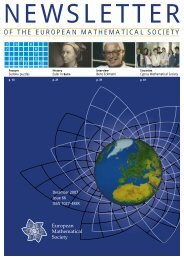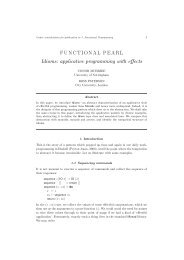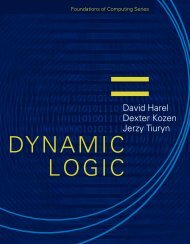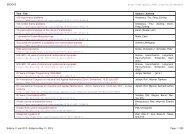wcms_161662
wcms_161662
wcms_161662
Create successful ePaper yourself
Turn your PDF publications into a flip-book with our unique Google optimized e-Paper software.
has found that recruiting new members has been difficult, because of a fear of<br />
discrimination among employees in the offshore sector. 109<br />
164. Some also argue that unions and employees gain little compared with employers, and that<br />
trade unions would be more fruitfully employed engaging in strike action to generate<br />
benefits for their members. An examination of the 2003–04 version of the agreement<br />
between the AEEU and GMB unions with the Offshore Contractors’ Association leads to<br />
the conclusion that the agreement falls short of meeting recognized definitions of genuine<br />
partnership, such as those put forward by the Involvement and Participation Association.<br />
The agreement contains no explicit commitment to job security, aside from an agreement<br />
to improve performance through a focus on terms and conditions of employment, which<br />
would recognize loyalty, skills and experience within the industry’s overall economic<br />
position. While a commitment to job security might be found through other company<br />
policies, the absence of one of the key building blocks of genuine partnership in this<br />
agreement undermines arguments that a partnership can form the basis of good industrial<br />
relations. 110<br />
165. Others argue that pre-emptive agreements constitute a no-strike clause. 111 Partnership<br />
agreements with employers represent a pyrrhic victory for unions, having delivered few<br />
meaningful improvements to oil workers’ working conditions, and do not signal an<br />
extension of the role of unions in the oil industry. In fact, partnership agreements may limit<br />
a resurgence of organized labour, and may not offer genuine “partnership” between<br />
management and unions in practice in the oil industry. The Employment Relations Act, by<br />
offering no recourse to alternative representation through other unions if workers are<br />
dissatisfied with current recognition arrangements, effectively limits the rights of<br />
workers. 112<br />
4.2.6.2. At company level<br />
166. Good employer–employee relations are critical to the stable production and supply of<br />
crude oil. Industrial action in any part of the supply chain can have quick, severe and farreaching<br />
effects. Established companies have an identity and a specific culture that affect<br />
the way employees operate and think about their business.<br />
167. At the NOCs in the Middle East, for example, industrial relations are governed by the<br />
inherited national culture of dialogue. At some NOCs, external factors such as the<br />
influence of the IOCs have affected the corporate culture. By contrast, national economic<br />
development policies contribute to defining the function of dialogue in industrial relations<br />
at the NOCs. Regardless of the industrial relations system, trust and confidence must be in<br />
place and fostered by tripartite or bipartite collaboration. Each Middle Eastern NOC has a<br />
specific culture that informs its management and decision-making procedures. Kuwait<br />
Petroleum Company (KPC) has a distinctive informal and formal dialogue mechanism<br />
inside and outside the company. A feature of the Kuwaiti culture of dialogue which<br />
influences KPC is the holding of diwaniyyas – social gatherings hosted by leading Kuwaiti<br />
families and sometimes by an industry group, including KPC. Diwaniyyas are the channel<br />
through which wasta (influence through connections) is exercised and special favours are<br />
granted. For example, wasta can help KPC by enabling its professionals to appeal to<br />
109 G. Martin et al., op. cit.<br />
110 A. Cumbers, op. cit.<br />
111 C. Woolfson and M. Beck, op. cit.<br />
112 A. Cumbers, op. cit.<br />
TMOGE-R-[2008-12-0110-1]-En.doc/v3 73


